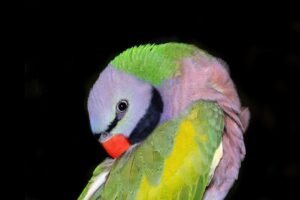Fancy rats, also known as domestic rats, have gained popularity as pets in recent years due to their intelligence, social nature, and adaptability to human environments. These small rodents are known for their interactive personalities and ability to form strong bonds with their owners. Fancy rats come in various colors and coat patterns, offering visual diversity to potential pet owners.
One of the primary advantages of keeping fancy rats as pets is their compact size, making them suitable for individuals with limited living space. They are also relatively low-maintenance pets, requiring basic care and attention. Fancy rats are naturally clean animals, grooming themselves regularly, which can be appealing to pet owners seeking a hygienic companion.
The intelligence of fancy rats is a notable characteristic that contributes to their appeal as pets. They can be trained to perform tricks and respond to commands, demonstrating cognitive abilities comparable to some larger pets. Many fancy rat owners have successfully litter-trained their pets, further enhancing their suitability for indoor living.
Fancy rats are social creatures that thrive on interaction with both their human caregivers and other rats. This social nature makes them engaging pets for individuals and families alike. Their playful behavior and affectionate tendencies often surprise first-time rat owners, challenging common misconceptions about rodents as pets.
The increasing popularity of fancy rats as pets has led to a growing community of enthusiasts who share information, experiences, and resources related to rat care. This support network has contributed to improved understanding of rat health, behavior, and husbandry, further solidifying the position of fancy rats as beloved companion animals.
Key Takeaways
- Fancy rats are appealing pets due to their intelligence, sociability, and low maintenance care.
- Fancy rats are known for their friendly and affectionate nature, making them great companions for both individuals and families.
- When housing fancy rats, it’s important to provide a spacious cage with plenty of enrichment and opportunities for exercise.
- Socialization and bonding with fancy rats is crucial for their well-being, and they thrive on interaction with their human companions.
- Regular veterinary check-ups, a balanced diet, and a clean living environment are essential for maintaining the health and wellness of fancy rats.
Characteristics and Behavior of Fancy Rats
Socialization and Companionship
In the wild, rats live in large colonies and have a strong need for companionship. As pets, fancy rats should ideally be kept in same-gender pairs or small groups to fulfill their social needs.
Activity and Stimulation
They are also very active animals and require plenty of mental and physical stimulation to keep them happy and healthy. Fancy rats are curious by nature and enjoy exploring their environment, so providing them with toys, tunnels, and climbing structures can help keep them entertained.
Intelligence and Enrichment
In addition to their social nature, fancy rats are also known for their intelligence. They are quick learners and can be trained to respond to their names, perform tricks, and even navigate mazes. This intelligence makes them fascinating pets to interact with and provides opportunities for enrichment through training and mental stimulation. Fancy rats are also very clean animals that groom themselves regularly, which helps to keep their fur in good condition. Overall, the characteristics and behavior of fancy rats make them delightful pets for people who are looking for an interactive and engaging animal companion.
Housing and Care Requirements for Fancy Rats

When it comes to housing fancy rats, it’s important to provide them with a spacious and enriching environment. A large cage with multiple levels, platforms, and hiding spots is ideal for fancy rats, as it allows them to exercise and explore their surroundings. The cage should also be equipped with a solid floor to prevent injury to their feet and a secure door to prevent escape.
Bedding material such as paper-based bedding or aspen shavings should be used to provide a comfortable and absorbent substrate for the rats. In terms of care requirements, fancy rats need a balanced diet that includes a high-quality rat pellet as the main component, supplemented with fresh fruits, vegetables, and occasional treats. Fresh water should always be available in a water bottle or dish that is securely attached to the cage.
Additionally, regular cage cleaning is essential to maintain a healthy living environment for the rats. Spot cleaning should be done daily, while a thorough cage cleaning should be done at least once a week to remove waste and soiled bedding. Providing appropriate housing and care for fancy rats is crucial in ensuring their well-being and happiness as pets.
Socialization and Bonding with Fancy Rats
| Aspect | Metrics |
|---|---|
| Time spent socializing | 1-2 hours daily |
| Types of socialization | Handling, playing, grooming |
| Signs of bonding | Seeking human interaction, grooming each other |
| Behavioral indicators | Relaxed body language, bruxing, boggling |
Socialization and bonding are key aspects of caring for fancy rats as pets. These social creatures thrive on interaction with their human companions and can form strong bonds with their owners. Spending time with your rats every day is important for building trust and strengthening your bond with them.
This can include gentle handling, offering treats, and engaging in playtime activities such as letting them explore outside of their cage in a safe and supervised environment. It’s also important to provide your fancy rats with opportunities for social interaction with other rats. Keeping them in same-gender pairs or small groups allows them to engage in natural social behaviors and prevents them from becoming lonely or bored.
When introducing new rats to each other, it’s best to do so gradually in a neutral territory to minimize potential conflicts. With patience and positive reinforcement, you can help your fancy rats feel secure and comfortable in their interactions with both humans and other rats.
Health and Wellness of Fancy Rats
Maintaining the health and wellness of fancy rats is essential for ensuring their quality of life as pets. Regular veterinary check-ups are important for monitoring their overall health and addressing any potential medical issues. Common health concerns for fancy rats include respiratory infections, tumors, dental problems, and parasites.
It’s important to be vigilant about any changes in your rat’s behavior or appearance and seek veterinary care if you have any concerns about their health. In addition to veterinary care, providing a balanced diet, clean living environment, and regular exercise is crucial for keeping fancy rats healthy. Ensuring that they have access to fresh water at all times is also important for preventing dehydration.
Regular grooming is another aspect of maintaining the health of fancy rats, as it helps to keep their fur clean and free from tangles or matting.
Training and Enrichment for Fancy Rats

Stimulating Minds and Bodies
Training and enrichment activities are essential for stimulating the minds of fancy rats and providing them with opportunities for mental and physical exercise. These intelligent creatures can be trained to perform a variety of tricks using positive reinforcement techniques such as clicker training or offering treats as rewards.
Teaching Tricks and Bonding
Teaching your rats simple tricks like coming when called or navigating through an agility course can be a fun way to bond with them and provide mental stimulation. This interaction not only strengthens your relationship but also challenges their problem-solving skills.
Enrichment Activities for Engagement
Enrichment activities such as providing toys, tunnels, climbing structures, and puzzle feeders can also help keep fancy rats engaged and entertained. Rotating toys regularly and introducing new items into their environment can prevent boredom and encourage exploration.
Supervised Playtime and Exploration
Additionally, allowing your rats supervised playtime outside of their cage in a safe and rat-proofed area can provide them with opportunities for exercise and mental stimulation. This freedom to explore and play helps to keep them happy and healthy.
Why Fancy Rats Make Great Pets
In conclusion, fancy rats make wonderful pets for people who are looking for interactive, intelligent, and affectionate animal companions. Their social nature, intelligence, trainability, and low maintenance requirements make them well-suited for a variety of pet owners. With proper housing, care, socialization, and enrichment, fancy rats can thrive in a home environment and bring joy to their human companions.
By understanding the appeal of fancy rats, their characteristics and behavior, housing and care requirements, socialization and bonding needs, health and wellness considerations, as well as training and enrichment opportunities, pet owners can provide the best possible care for these delightful creatures. Whether you’re an experienced pet owner or considering a rat as your first pet, fancy rats have a lot to offer as loving and engaging companions.
If you’re interested in unique and unconventional pets, you might also enjoy reading about the growing trend of keeping fancy rats as pets. These intelligent and social creatures are gaining popularity among animal lovers. To learn more about unusual pets, check out the article on America Ferrera’s groundbreaking Oscar nomination for Barbie and discover how people are embracing non-traditional companions.
FAQs
What are fancy rats?
Fancy rats are domesticated brown rats (Rattus norvegicus) that have been selectively bred for desirable traits such as temperament, color, and coat type. They are kept as pets and are distinct from wild rats.
What is the average lifespan of a pet fancy rat?
Pet fancy rats typically live for about 2-3 years, although some may live longer with proper care and genetics.
What are the common colors and coat types of fancy rats?
Fancy rats come in a wide variety of colors and coat types, including agouti, black, blue, champagne, chocolate, cinnamon, fawn, and more. They can also have different coat patterns such as hooded, Berkshire, dumbo, rex, and satin.
What kind of housing and environment do fancy rats need?
Fancy rats require a spacious cage with multiple levels for climbing and exploring. They also need bedding material, toys, and hiding spots. The cage should be kept in a quiet, draft-free area with proper ventilation and temperature control.
What do fancy rats eat?
Fancy rats should be fed a balanced diet of commercial rat pellets, supplemented with fresh fruits, vegetables, and occasional treats. They also need access to fresh water at all times.
Are fancy rats social animals?
Yes, fancy rats are highly social animals and should ideally be kept in same-gender pairs or small groups to prevent loneliness and provide mental stimulation.
Do fancy rats require regular veterinary care?
Yes, fancy rats should receive regular veterinary check-ups to monitor their health and address any potential medical issues. They may also require vaccinations and parasite prevention.
Are fancy rats suitable pets for children?
Fancy rats can make great pets for responsible children under adult supervision. However, it’s important to teach children proper handling and care to ensure the well-being of the rats.




















+ There are no comments
Add yours